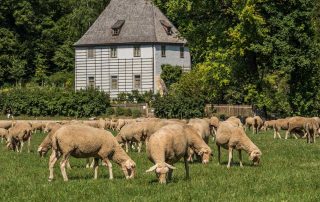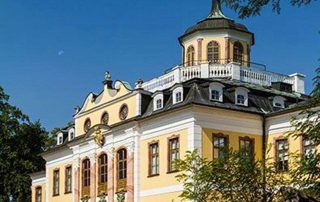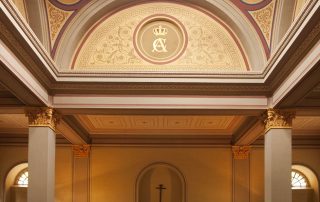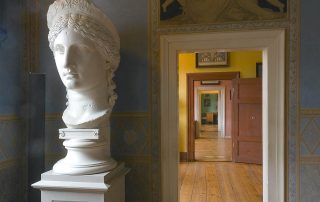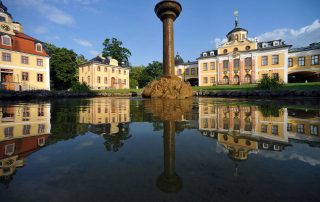
Classical Weimar
For centuries, Weimar in Thuringia was at the centre of intellectual life in Germany: the city experienced its heyday in the early 19th century when it was home to no fewer than three of Europe’s leading intellectuals – Goethe, Schiller and Herder. The Classical Weimar ensemble is testimony to the enlightened, courtly but also civic culture of the period around 1800.
A new era of tolerance, education for the masses and Humanist views: Weimar became a focal point of European intellectual thought and Weimar Classicism became a part of World Cultural Heritage. Important reminders of Classical Weimar include the baroque house on Frauenplan that was Goethe’s home for almost 50 years. Today, the house looks largely as it did during the final years of his life. Diagonally opposite is the Zum Weissen Schwan where the great master liked to indulge in a beer – and it’s still open for business today. Goethe’s summer house in the park on the river Ilm was a gift from Duke Carl August to tie the poet to Weimar – and it was always to remain his sanctuary in the midst of nature.
The name of Friedrich Schiller is also inextricably linked with Weimar. The writer spent the final years of his life in a town house on what was then the Weimar esplanade. Nowadays the house is furnished with period furniture, some of which is original, while the permanent exhibition ‚Schiller in Thuringia‘ gives an insight into his life and work.
The philosopher and theologian Johann Gottfried Herder came to Weimar at the insistence of Goethe. The garden of his home and the town church in which he worked as a priest can still be visited in Weimar today.
With literary works spanning the 14th to the 21st century, the Duchess Anna Amalia library is a veritable temple to learning. At its heart is the famous Rococo Hall, which is now once again open to visitors in restricted numbers following a devastating fire in 2004.
People come in their droves every year for ‚Weimar Summer‘: with theatre, open-air concerts, exhibitions and much more, it offers another highlight nearly every day. The famous onion market in October, which attracts around 300,000 visitors, is the biggest Volksfest not only in Weimar but also in the whole of Thuringia.
Classical Weimar
UNESCO World Heritage since 1998
From the selection criteria
„Classical Weimar“ is a unique testimony of a past, yet lingering cultural era.
The recognition is due to the „great art historically importance of public and private buildings and park landscapes from the heyday of classical Weimar“ and with the „prominent role of Weimar as a centre of intellect in
the late 18th century and early 19th century „.Enlightened ducal patronage attracted many of the leading writers and thinkers in Germany, such as Goethe, Schiller, and Herder to Weimar in the late
18th and early 19th century, making it the cultural centre of the Europe of that time.
Information and Contact
Tourist-Information Weimar
Markt 10
99423 Weimar
Tel.+49 3643-74 50


